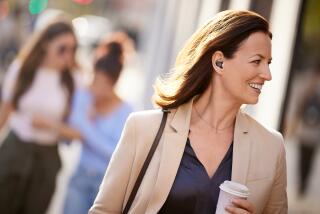Over-the-counter devices probably won’t help sleep apnea
Big-time, bed-rattling snoring is more than just a detriment to good sleep or happy relationships. It’s also a sign that airways aren’t open and clear. In extreme cases, snorers spend chunks of the night gasping for breath, a dangerous condition called sleep apnea. If they could somehow open up their airways, they would breathe easier without all of the racket and without the risk.
Instead of sucking air through a mask or going under the knife — two common approaches to apnea — many snorers hope they can get extra breathing room with the help of an oral appliance that fits inside the mouth.
The options for oral appliances fall in two main categories: prescription devices you can get from a dentist or orthodontist and do-it-yourself products you can order online. All work by moving the lower jaw forward to create extra space in the airway, but they vary wildly in terms of cost.
Prescription devices such as the TAP 3 (short for Thornton adjustable positioner) are crafted in a lab to fit each individual mouth. They can cost roughly $2,000 to $3,000, including dentist fees. The TAP comes with an adjustment key that enables patients to gradually move the jaw a few millimeters at a time. It generally lasts three to five years.
Many dentists offer plastic “boil-and-bite” devices, such as the TheraSnore, that can be fitted during your visit for $300 to $800.
If that still sounds like a lot of money for a quiet night’s sleep, you might be tempted by an over-the-counter anti-snoring appliance. The VitalSleep appliance from the Stop Snoring Co. sells for about $40. It’s supposed to last about a year.
Claims
The website for the TAP 3 says that it is “currently being prescribed by over 7,000 dentists worldwide to cure snoring and sleep apnea.” Steve Moore, vice president of marketing for Airway Management Inc., which makes TAP 3, says the device is more comfortable and effective than anything made in the dentist’s office.
The TheraSnore website says that the device is “93% effective in treating mild to moderate obstructive sleep apnea and simple snoring.” Jennifer Whealy, general manager of Distar, the company behind TheraSnore, says the device is a cost-effective alternative to lab-made appliances. She says that it can be a good choice for people who can’t or won’t try CPAP, the standard apnea treatment that delivers air through a mask.
The VitalSleep website says that the device can “help you stop snoring and start enjoying a restful” night’s sleep. Company President David Hernandez says he developed it after spending $2,000 on a custom-fit appliance that broke after a few months.
Hernandez says the device is not meant to treat sleep apnea. However, the site gives a mixed message. Potential customers are required to fill out an online questionnaire to see if they are eligible to buy the product; although people with dentures or certain jaw problems are excluded, customers who say they have sleep apnea are encouraged to whip out their credit card.
The bottom line
Prescription devices that pull the lower jaw forward can relieve snoring and are often effective for mild to moderate cases of sleep apnea, says Dr. Barbara Phillips, a sleep specialist at the University of Kentucky College of Medicine and a board member of the National Sleep Foundation.
But, she adds, inexpensive, over-the-counter appliances are unproven and potentially dangerous. People with apnea need professional attention from a doctor or a dentist, she warns, not a $40 mouthpiece purchased over the Internet. “Just because something is cheap doesn’t mean it’s worth a try,” she says.
Dr. Alan Lowe, professor of orthodontics at the University of British Columbia in Vancouver, says that nonprescription appliances can relieve snoring without addressing the apnea, creating an easy-to-overlook “silent apnea” that could still threaten health.
Among the prescription devices, there’s some evidence that the most expensive options are also the most effective. In a 2008 Belgian study, 35 patients with mild sleep apnea tried a custom-fitted appliance and a boil-and-bite device for four months each. Twenty-one were able to successfully control their snoring and apnea with the custom device, but only 11 had such luck with the boil-and-bite model. Nineteen out of 23 patients who stuck with each appliance for the full four months said they preferred the custom appliance.
Lowe and colleagues recently surveyed 58 Japanese patients who had been prescribed TheraSnore. Thirty-five were still using the device six months later, and almost all of that 35 said it seemed to help their snoring and apnea. Those who gave up often said that it was uncomfortable or caused dry mouth or excessive salivation.
Even high-end prescription models won’t work for everyone, says Dr. Philip Zapanta, an otolaryngologist at the George Washington University Medical Center in Washington, D.C. Very overweight patients (those with a body mass index above 30) or anyone with severe apnea should probably start with CPAP, the treatment that’s considered the “gold standard” of apnea treatment.
Zapanta says a cheap mouthpiece “could definitely help with snoring,” but he doesn’t think that anyone should ever try to solve an apnea problem over the Internet. “At some point, you need to see a health provider.”





